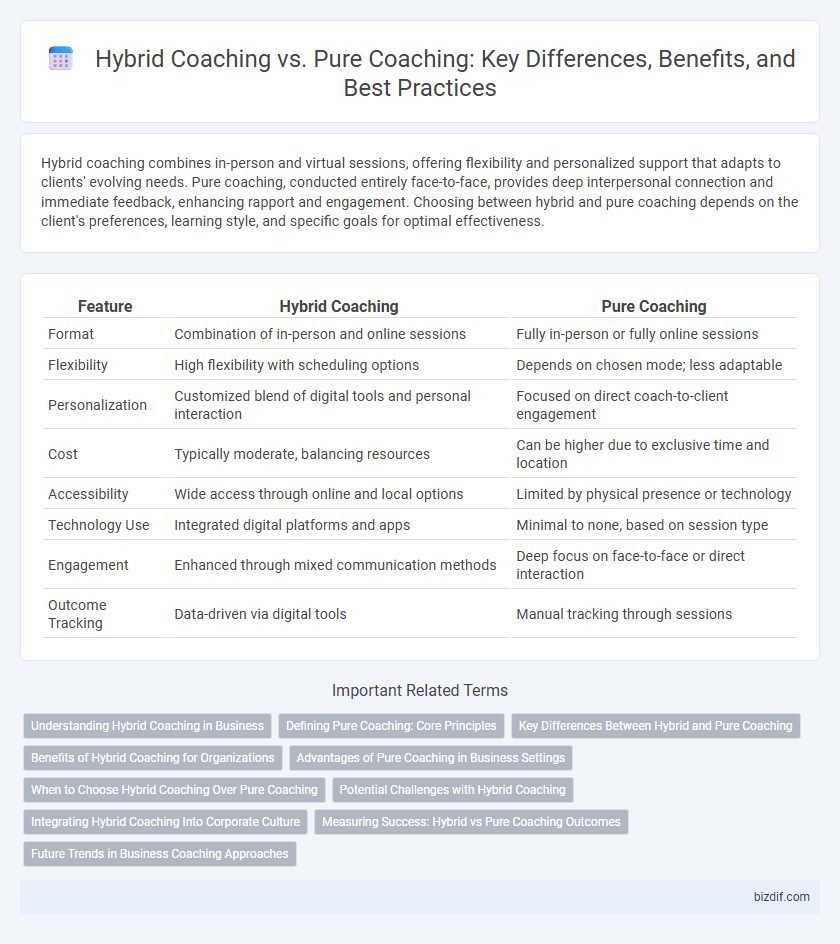Hybrid coaching combines in-person and virtual sessions, offering flexibility and personalized support that adapts to clients' evolving needs. Pure coaching, conducted entirely face-to-face, provides deep interpersonal connection and immediate feedback, enhancing rapport and engagement. Choosing between hybrid and pure coaching depends on the client's preferences, learning style, and specific goals for optimal effectiveness.
Table of Comparison
| Feature | Hybrid Coaching | Pure Coaching |
|---|---|---|
| Format | Combination of in-person and online sessions | Fully in-person or fully online sessions |
| Flexibility | High flexibility with scheduling options | Depends on chosen mode; less adaptable |
| Personalization | Customized blend of digital tools and personal interaction | Focused on direct coach-to-client engagement |
| Cost | Typically moderate, balancing resources | Can be higher due to exclusive time and location |
| Accessibility | Wide access through online and local options | Limited by physical presence or technology |
| Technology Use | Integrated digital platforms and apps | Minimal to none, based on session type |
| Engagement | Enhanced through mixed communication methods | Deep focus on face-to-face or direct interaction |
| Outcome Tracking | Data-driven via digital tools | Manual tracking through sessions |
Understanding Hybrid Coaching in Business
Hybrid coaching in business combines both in-person and virtual sessions to offer flexible, personalized development for leaders and employees. This approach maximizes engagement, allowing real-time feedback and continuous support while reducing travel costs and time constraints. By integrating technology with traditional methods, hybrid coaching enhances skill acquisition and adapts to diverse learning preferences in dynamic organizational environments.
Defining Pure Coaching: Core Principles
Pure coaching centers on personalized, client-driven sessions that prioritize active listening, powerful questioning, and fostering self-discovery without providing direct advice or solutions. It emphasizes confidentiality, trust, and maintaining a non-judgmental space where clients set their own goals and pace. Core principles include empathy, accountability, and facilitating mindset shifts that empower lasting personal and professional growth.
Key Differences Between Hybrid and Pure Coaching
Hybrid coaching combines virtual and in-person sessions, offering flexible scheduling and broader accessibility, whereas pure coaching typically involves exclusively face-to-face interaction, emphasizing deep personal connection. Hybrid coaching leverages digital tools for progress tracking and remote communication, while pure coaching relies heavily on physical presence for real-time feedback and engagement. The key differences lie in delivery methods, client convenience, and the balance of technology integration.
Benefits of Hybrid Coaching for Organizations
Hybrid coaching integrates both virtual and in-person sessions, enhancing flexibility and accessibility for employees across diverse locations and schedules. This approach supports personalized development plans while leveraging digital tools for continuous feedback and performance tracking. Organizations experience improved employee engagement, faster skill acquisition, and measurable impacts on productivity through hybrid coaching models.
Advantages of Pure Coaching in Business Settings
Pure coaching in business settings offers the advantage of deeply personalized guidance tailored to individual leadership development and organizational culture. It fosters authentic connections and trust, enabling executives to explore challenges and opportunities with greater openness and reflective insight. This focused approach accelerates behavioral change and sustainable performance improvements without the distractions of mixed methodologies.
When to Choose Hybrid Coaching Over Pure Coaching
Hybrid coaching combines in-person and virtual methods to offer flexibility and personalized support, ideal for clients juggling busy schedules or remote locations. It enhances engagement through varied interaction modes, suitable when consistent availability or diverse learning preferences are priorities. Pure coaching fits best when deep, uninterrupted focus and physical presence are essential for client breakthroughs and trust-building.
Potential Challenges with Hybrid Coaching
Hybrid coaching often faces potential challenges such as maintaining consistent communication and engagement across both in-person and virtual platforms. Balancing the personalized feedback that pure coaching offers with the flexibility of hybrid formats can lead to reduced effectiveness if not managed carefully. Technical issues and varying participant comfort levels with digital tools may further complicate the coaching process.
Integrating Hybrid Coaching Into Corporate Culture
Integrating hybrid coaching into corporate culture enhances employee engagement by combining in-person and virtual sessions tailored to diverse learning preferences, increasing flexibility and accessibility. This approach supports continuous professional development through technology-enabled feedback and real-time collaboration, fostering a growth-oriented environment. Companies adopting hybrid coaching report improved performance metrics and higher retention rates due to personalized, scalable coaching experiences.
Measuring Success: Hybrid vs Pure Coaching Outcomes
Hybrid coaching integrates digital tools and in-person methods, enabling precise tracking of client progress through analytics and real-time feedback, which enhances outcome measurement. Pure coaching relies primarily on direct interaction and subjective assessments, making quantification of success more challenging and dependent on qualitative insights. Studies show that hybrid coaching often yields higher overall satisfaction rates and faster achievement of goals due to its data-driven approach to monitoring and adjusting techniques.
Future Trends in Business Coaching Approaches
Hybrid coaching integrates digital tools with traditional face-to-face methods, enabling scalable, personalized business coaching that meets the evolving needs of modern clients. Data analytics and AI-driven insights enhance hybrid coaching by providing targeted feedback and adaptive learning paths, improving client outcomes. Pure coaching remains valuable for deep interpersonal connection, but future trends indicate hybrid models will dominate due to their flexibility and efficiency in complex business environments.
Hybrid Coaching vs Pure Coaching Infographic

 bizdif.com
bizdif.com